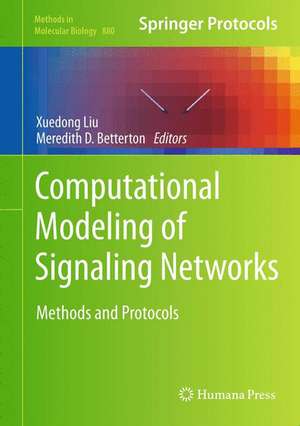Computational Modeling of Signaling Networks: Methods in Molecular Biology, cartea 880
Editat de Xuedong Liu, Meredith D. Bettertonen Limba Engleză Hardback – 12 iun 2012
Thorough and intuitive, Computational Modeling of Signaling Networks: Methods and Protocols aids scientists in continuing study of how signaling networks behave in space and time to generate specific biological responses and how those responses impact biology and medicine.
| Toate formatele și edițiile | Preț | Express |
|---|---|---|
| Paperback (1) | 703.38 lei 6-8 săpt. | |
| Humana Press Inc. – 23 aug 2016 | 703.38 lei 6-8 săpt. | |
| Hardback (1) | 957.62 lei 6-8 săpt. | |
| Humana Press Inc. – 12 iun 2012 | 957.62 lei 6-8 săpt. |
Din seria Methods in Molecular Biology
- 9%
 Preț: 791.63 lei
Preț: 791.63 lei - 23%
 Preț: 598.58 lei
Preț: 598.58 lei - 20%
 Preț: 882.98 lei
Preț: 882.98 lei -
 Preț: 252.05 lei
Preț: 252.05 lei - 5%
 Preț: 802.70 lei
Preț: 802.70 lei - 5%
 Preț: 729.61 lei
Preț: 729.61 lei - 5%
 Preț: 731.43 lei
Preț: 731.43 lei - 5%
 Preț: 741.30 lei
Preț: 741.30 lei - 5%
 Preț: 747.16 lei
Preț: 747.16 lei - 15%
 Preț: 663.45 lei
Preț: 663.45 lei - 18%
 Preț: 1025.34 lei
Preț: 1025.34 lei - 5%
 Preț: 734.57 lei
Preț: 734.57 lei - 18%
 Preț: 914.20 lei
Preț: 914.20 lei - 15%
 Preț: 664.61 lei
Preț: 664.61 lei - 15%
 Preț: 654.12 lei
Preț: 654.12 lei - 18%
 Preț: 1414.74 lei
Preț: 1414.74 lei - 5%
 Preț: 742.60 lei
Preț: 742.60 lei - 20%
 Preț: 821.65 lei
Preț: 821.65 lei - 18%
 Preț: 972.30 lei
Preț: 972.30 lei - 15%
 Preț: 660.49 lei
Preț: 660.49 lei - 5%
 Preț: 738.41 lei
Preț: 738.41 lei - 18%
 Preț: 984.92 lei
Preț: 984.92 lei - 5%
 Preț: 733.29 lei
Preț: 733.29 lei -
 Preț: 392.60 lei
Preț: 392.60 lei - 5%
 Preț: 746.26 lei
Preț: 746.26 lei - 18%
 Preț: 962.66 lei
Preț: 962.66 lei - 23%
 Preț: 860.22 lei
Preț: 860.22 lei - 15%
 Preț: 652.64 lei
Preț: 652.64 lei - 5%
 Preț: 1055.50 lei
Preț: 1055.50 lei - 23%
 Preț: 883.87 lei
Preț: 883.87 lei - 5%
 Preț: 1141.13 lei
Preț: 1141.13 lei - 19%
 Preț: 491.89 lei
Preț: 491.89 lei - 5%
 Preț: 1038.86 lei
Preț: 1038.86 lei - 5%
 Preț: 524.16 lei
Preț: 524.16 lei - 18%
 Preț: 2122.34 lei
Preț: 2122.34 lei - 5%
 Preț: 1299.23 lei
Preț: 1299.23 lei - 5%
 Preț: 1339.12 lei
Preț: 1339.12 lei - 18%
 Preț: 1390.26 lei
Preț: 1390.26 lei - 18%
 Preț: 1395.63 lei
Preț: 1395.63 lei - 18%
 Preț: 1129.65 lei
Preț: 1129.65 lei - 18%
 Preț: 1408.26 lei
Preț: 1408.26 lei - 18%
 Preț: 1124.92 lei
Preț: 1124.92 lei - 18%
 Preț: 966.27 lei
Preț: 966.27 lei - 5%
 Preț: 1299.99 lei
Preț: 1299.99 lei - 5%
 Preț: 1108.51 lei
Preț: 1108.51 lei - 5%
 Preț: 983.76 lei
Preț: 983.76 lei - 5%
 Preț: 728.16 lei
Preț: 728.16 lei - 18%
 Preț: 1118.62 lei
Preț: 1118.62 lei - 18%
 Preț: 955.25 lei
Preț: 955.25 lei - 5%
 Preț: 1035.62 lei
Preț: 1035.62 lei
Preț: 957.62 lei
Preț vechi: 1167.83 lei
-18% Nou
Puncte Express: 1436
Preț estimativ în valută:
183.26€ • 198.100$ • 153.94£
183.26€ • 198.100$ • 153.94£
Carte tipărită la comandă
Livrare economică 23 aprilie-07 mai
Preluare comenzi: 021 569.72.76
Specificații
ISBN-13: 9781617798320
ISBN-10: 1617798320
Pagini: 245
Ilustrații: XIV, 327 p.
Dimensiuni: 178 x 254 x 25 mm
Greutate: 0.79 kg
Ediția:2012
Editura: Humana Press Inc.
Colecția Humana
Seria Methods in Molecular Biology
Locul publicării:Totowa, NJ, United States
ISBN-10: 1617798320
Pagini: 245
Ilustrații: XIV, 327 p.
Dimensiuni: 178 x 254 x 25 mm
Greutate: 0.79 kg
Ediția:2012
Editura: Humana Press Inc.
Colecția Humana
Seria Methods in Molecular Biology
Locul publicării:Totowa, NJ, United States
Public țintă
Professional/practitionerCuprins
Predictive Models for Cellular Signaling Networks.-Analysing and Constraining Signaling Networks: Parameter Estimation for the User.-A Tutorial on Mathematical Modeling of Biological Signaling Pathways.-Bistability in one Equation or Fewer.-Mathematical Investigation of How Oncogenic Ras Mutants Promote Ras Signaling.-Modelling miRNA Regulation in Cancer Signalling Systems. miR-34a Regulation of the p53/Sirt1 Signalling Module.-Design of Experiments to Investigate Dynamic Cell Signaling Models.-Mathematical Modeling of Biochemical Systems with PottersWheel.-Rule-Based Modeling of Signal Transduction: APrimer.-Computational Modeling of Signal Transduction Networks: A Pedagogical Exposition.-Modeling Spatiotemporal Dynamics of Bacterial Populations.-Discrete Dynamic Modeling of Signal Transduction Networks.-Analytic Methods for Modeling Stochastic Regulatory Networks.
Textul de pe ultima copertă
Signaling networks are composed of numerous signaling pathways and each has its own intricate component parts. Signaling outputs are dynamic, extraordinarily complex and yet highly specific. In, Computational Modeling of Signaling Networks: Methods and Protocols, expert researchers in the field provide key techniques to study signaling networks. Focusing on Systems of ODEs, parameterization of signaling models, signaling pathways, mass-action kinetics and ODEs, and how to use modeling to plan experiments. Written in the highly successful Methods in Molecular Biology™ series format, the chapters include the kind of detailed description and implementation advice that is crucial for getting optimal results in the laboratory.
Thorough and intuitive, Computational Modeling of Signaling Networks: Methods and Protocols aids scientists in continuing study of how signaling networks behave in space and time to generate specific biological responses and how those responses impact biology and medicine.
Thorough and intuitive, Computational Modeling of Signaling Networks: Methods and Protocols aids scientists in continuing study of how signaling networks behave in space and time to generate specific biological responses and how those responses impact biology and medicine.
Caracteristici
Demonstrates how modeling is currently being applied to research in signaling Provides step-by-step detail essential for reproducible results Contains key notes and implementation advice from the experts Includes supplementary material: sn.pub/extras








